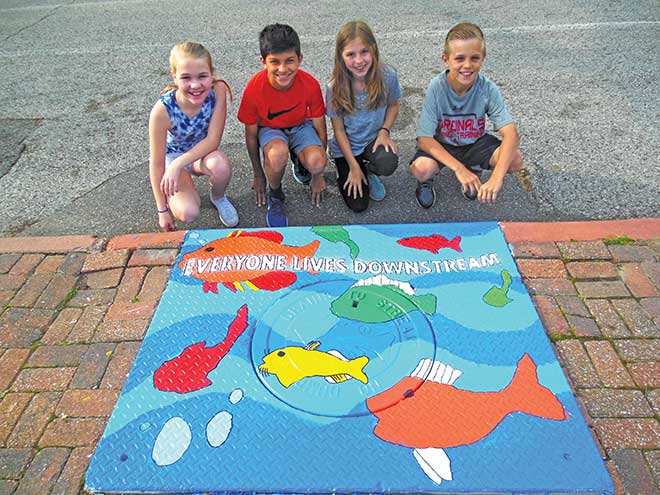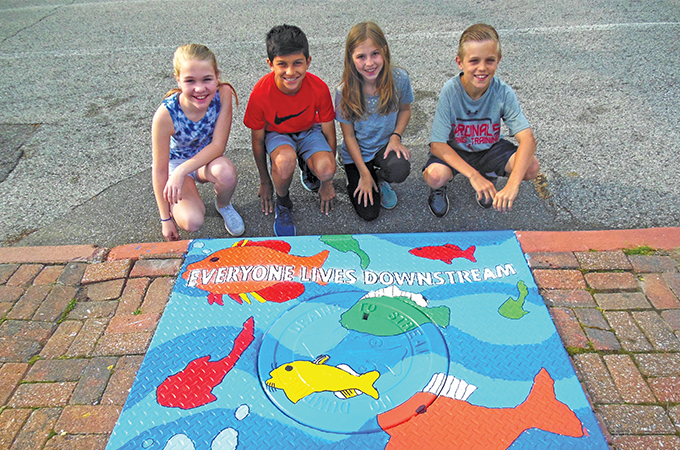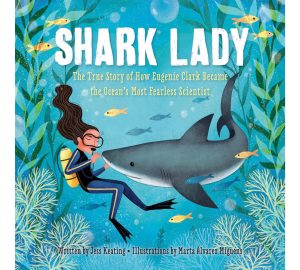Area students are learning that you don’t have to be an adult to impact the life and health of the planet. Kids of all ages are banding together at local schools to launch innovative projects that conserve water and energy, recycle materials, reduce pollution and preserve the earth’s creatures. They’re helping make sure the planet stays vibrant and livable for generations to come. And many are feeling inspired to keep the cycle going by pursuing environmental science careers, teachers say.
water matters | forsyth school
Sixth-graders at Forsyth School are learning respect for the planet by helping the student body understand how water can be used more efficiently and responsibly. Teacher Susan Zareh, co-chair of the Go Green Forsyth! program, says students are translating their knowledge of the community’s water system into important lessons on conserving this vital resource. Field trips, classroom work and speakers have sparked their interest in what happens to local water, from its river origins to its use in homes and buildings, she notes.
Zareh says students surveyed sites where water is consumed on campus and tallied up how much was being used by sinks, toilets and other fixtures. “We compared that data to the water bills we receive, and determined that the buildings with lawn irrigation systems were the biggest users,” she notes. So students worked with the facility management office to install sensors that make the lawn sprinklers more efficient. “If there’s been enough rain, the sensors prevent the sprinklers from coming on,” Zareh says. Students even helped pay for the new system by selling items at a fundraising bazaar.
They also installed a rain barrel on the gutter system so they can water the school’s garden naturally, Zareh says. And they painted a water inlet, or sewer cover, with bright graphics as a reminder that everyone should care about the health of the water system. Before submitting their sustainability project to the 2017 Green Schools Quest competition, the sixth-graders also gave informative presentations to faculty, staff and students.
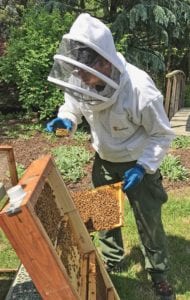 the bees’ needs | rohan woods school
the bees’ needs | rohan woods school
Bee populations have been declining in recent years, impacting crop pollination and the production of honey, beeswax and more. So Rohan Woods School in Warson Woods decided to help the population along by installing an indoor hive that allows students to learn about bees first-hand.
“Our first-graders had been studying animal life cycles, and we had used mealworms before, but they weren’t very exciting,” says science teacher Kim Breckenridge. “We wanted something in the classroom that would let us see an animal’s whole active life cycle. So we thought, why not bees?” She did some research and found the Bee Cause Project, a program that helps schools and other groups establish their own living hives. Rohan Woods’ hive was installed in a classroom this past April. It’s a vertical box with clear panes that allow students to watch bees in the colony work, grow, communicate, and produce honey and beeswax. “The bees also make propolis, a hive building material that may have medicinal properties,” Breckenridge says.
The hive is connected to the outdoors through a pipe in an opening in the wall, and students tend a native flowering garden to supply the bees with pollen. “It’s been so interesting for the kids, and it’s helping us all learn the importance of bees to the environment and the planet,” Breckenridge notes. “They are responsible for pollinating so many of the plants we eat and use.”
keep it green | kirkwood high school
When students at Kirkwood High School set out to create a positive environmental example for the community, they started in an unlikely place—an old campus greenhouse that had sat vacant for a decade.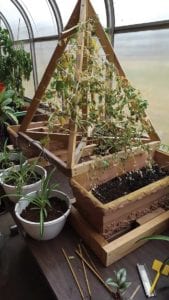
To start the project, the school’s Environmental Sustainability class refurbished the building and brought it back to life, says science and engineering teacher Mandy Melton. Then the work began. Students raise hydroponic plants, cultivate algae for use in biofuel studies, operate a compost system to reduce waste, and raise plants for the family and consumer science department to use in class.
“We’ve been studying hydroponics as an effective way to grow food versus traditional soil planting,” Melton says. “We also have been investigating biofuels and how to make them using oils collected from algae. We look at different aeration and lighting techniques for the algae to learn which ones create the highest yield.” As part of the overall project, students also installed a rain barrel and gutter system to capture and use water, and created worm bins to compost food scraps. The high school’s multifaceted effort earned it a 2017 first-place award in the U.S. Green Building Council’s Green Schools Quest, a program that recognizes creative, effective and low-cost environmental practices developed by elementary, middle and high schools. Several other Kirkwood schools also entered projects in this year’s competition.
Melton notes that a number of the high school’s graduates have been inspired to study environmental science in college as a result of the hands-on curriculum. “It really teaches them to bring sustainability full circle,” she says.
Many area schools are shining a spotlight on environmental responsibility. Here are some other local projects:
* Middle-schoolers at Miriam School in Webster Groves won a $1,000 grant from the Carton to Garden program for their innovative plant and garden irrigation system made from recycled milk containers. The grant was used to buy new plants and garden supplies.
* Fourth-graders at Saul Mirowitz Jewish Community School in Creve Coeur built a rain garden to help prevent erosion of the school’s campus prairie. During an average rainfall, it captures about 650 gallons of rainwater and runoff. Students also have been recycling foil-lined wrappers to keep them out of landfills.
* After studying the impact of water conservation, third-graders at Central Christian School in Clayton put their persuasive skills to work, creating art posters to hang around the school to encourage others to conserve. The student-run newspaper featured them in a cover story.
* The Environmental Conservation Organization (ECO) at Whitfield School in Creve Coeur works to educate others about environmental issues. ECO members develop projects like recycling cans and other materials. They also study sustainability and take part in community environmental projects.
